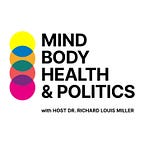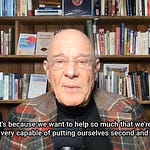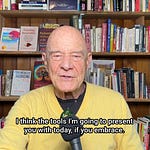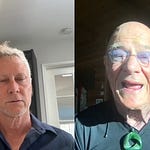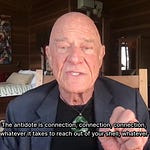Dear listeners,
This week’s episode explores the profound responsibility that comes with guiding others through the depths of human suffering that can emerge during psychedelic experiences.
I must warn my listeners that the discussion contains sensitive material; listener discretion is advised.
This week I spoke with Evan Sola, a licensed psychologist and MAPS treatment manual co-author, about the adverse effects and ethics of psychedelic care. Evan supports veterans and others through ketamine-assisted therapy and clinical trials in MDMA-assisted therapy for PTSD at UCSF. His dissertation explored transformations for combat veterans in daylong psychedelic therapy sessions.
Evan recounts instances of what he calls “demonic possession” arising in clients— animalistic and uncontained—with no memory of the experience after.
While psychedelics show promise for conditions like PTSD, confronting repressed demons is no small feat. Within our veterans population, an estimated 20 veterans commit suicide each day. Many suffer in isolation, ashamed to share the depths of their anguish. Psychedelic tools could help address this crisis, but only with strict safety precautions and professional guidance attuned to the dangers that may arise.
For therapists ill-prepared for the shadow material that may surface, the results can be traumatic, for both patient and therapist.
Evan will co-lead upcoming studies in psilocybin for alcohol use disorder and 5-MeO-DMT for treatment-resistant depression. With over a decade’s experience guiding psychedelic sessions, Evan is attuned to the suffering that can emerge and the support clients and therapists both require to navigate it.
“Whatever you're holding, whether you're a client, a therapist, or just a human being, I'd like to leave the message that you should connect, consult, collaborate, and communicate. Don't hold it alone, whatever it is you're holding.” – Evan Sola
In this time of open access, demand for psychedelic guidance far outstrips the supply of properly trained professionals. While interest grows, we must balance openness with safety; wider access needs oversight to prevent irresponsible use or adverse outcomes, especially for vulnerable groups.
I am currently collecting accounts from those suffering adverse effects of psychedelic use, including from those who benefited overall, to enable truly informed access through education and harm reduction.
The promise of psychedelic healing demands wisdom and care, not open access or profits alone. With responsibility, psychedelic sciences can blossom; without, they may harm those poised to benefit most.
Join me this week as Evan and I discuss the ethics and responsibilities that come with guiding others through the deepest recesses of human experience.
Golden light,
Dr. Richard Louis Miller
Key Takeaways:
The potential risks, challenges and adverse effects in psychedelic therapy with MDMA and ketamine.
The importance of a therapist's ability to hold a sense of relativity within themselves during psychedelic therapy.
The use of breathing exercises to help with anxiety during psychedelic therapy.
Dr. Evan Sola's work with combat veterans and their experiences with PTSD in psychedelic therapy.
The potential shock of repressed traumas being opened up during psychedelic therapy.
Finding the "right relationship with fear" rather than eliminating it entirely. Fear serves a purpose as a protector and warning signal.
The role of the therapist in helping clients navigate the amplification of consciousness in psychedelic therapy.
The responsibility that comes with guiding psychedelic sessions, and the self-care required for therapists.
Reaching out for community support after difficult psychedelic experiences.
Links and references:
Transcript
Dr. Richard Miller 0:00 Welcome to Mind Body Health and Politics, I'm your host, Dr. Richard Louis Miller. The mission of Mind Body Health and Politics is to enhance your physical and emotional well-being and encourage community. Living in community is the healthiest way for humans to live. When we know one another, we tend to be cooperative and collaborative. We like to do things together, create things together, and hang out together. However, there is a small percentage of people who are predators and would dominate the rest of us. These are the people who would be dictators over us and have us be subjects once again, rather than the citizens we became in our revolution. Remember, our revolution was the first time in almost 2000 years where people overthrew the king, went against the church, and formed what we have now, a democracy. But a republic and a democracy are not permanent. They are fragile institutions, and it takes all of us collaborating to maintain them and stop the dictators from taking over our country. In the words of my great hero, Thomas Jefferson, "Eternal vigilance is the price of liberty." Today on Mind Body Health and Politics, I have the privilege of interviewing Dr. Evan Sola. He is a licensed psychologist and the author of the famous MAPS treatment manual. MAPS is the Multidisciplinary Association for Psychedelic Science, which is leading the way in the world towards the FDA recognizing MDMA as a prescription drug. He is also a therapist working in MDMA clinical trials at the University of California, San Francisco, and doing other research. Welcome to Mind Body Health and Politics, Evan.
What’s on your radar screen?
Evan Sola 4:54 Thanks for having me, Richard. I'm excited to have this conversation with you today.
Dr. Richard Miller 5:00 What is currently on your radar screen? What is capturing your attention these days?
Evan Sola 5:09 Well, I guess there are a lot of things. But in the psychedelic therapy world, I've been working with maps for about 12 years now. I'm shifting my role with them a little bit away from being the therapist, although I'm sure I'll do that some more. I do some of that in my private practice. But I'm shifting into a little bit more of a supervisory, consultative, and teaching/training role. So it's been interesting to see what's in store for us for the next couple of years. We have a lot of people that we want to teach and hopefully have adopt this paradigm, and change psychotherapy through it.
Dr. Richard Miller 5:54 When you say that a lot of people are teaching Evan, what exactly are they teaching him? What is new about the training that wasn't there before?
Evan Sola 6:04 Um, well, I think that with psychedelic-assisted therapy, there is an expansion on the usual way we typically think of therapy. The one thing that is often said is that it's an amplified terrain or nonspecific amplification of consciousness. That can encompass the full gamut of human experience, including wonder, ecstasy, bliss, but also some scary stuff like terror and the horrible aspects of human experience, kind of like what you were describing in your introduction. The full round circle of what we do to each other as humans can come up in a therapy session, and teaching therapists to be ready to stay with that, to be with that, and accept what's emerging can be a difficult feat.
Dr. Richard Miller 7:12 Evan, many of us have heard about the positive effects of psychedelics, including MDMA (though it's technically not a psychedelic). We know about their potential to improve depression, anxiety, and end-of-life transitioning. We've read about the famous study by Roland Griffiths and Katherine McLean on depression at Johns Hopkins. However, we haven't heard much about the negative effects, such as terror and frightening experiences. Could you discuss any adverse effects you've encountered and share as much as possible about these experiences? The reason for exploring these unwanted complications is that the more we know, the better prepared we are to deal with them when they arise.


